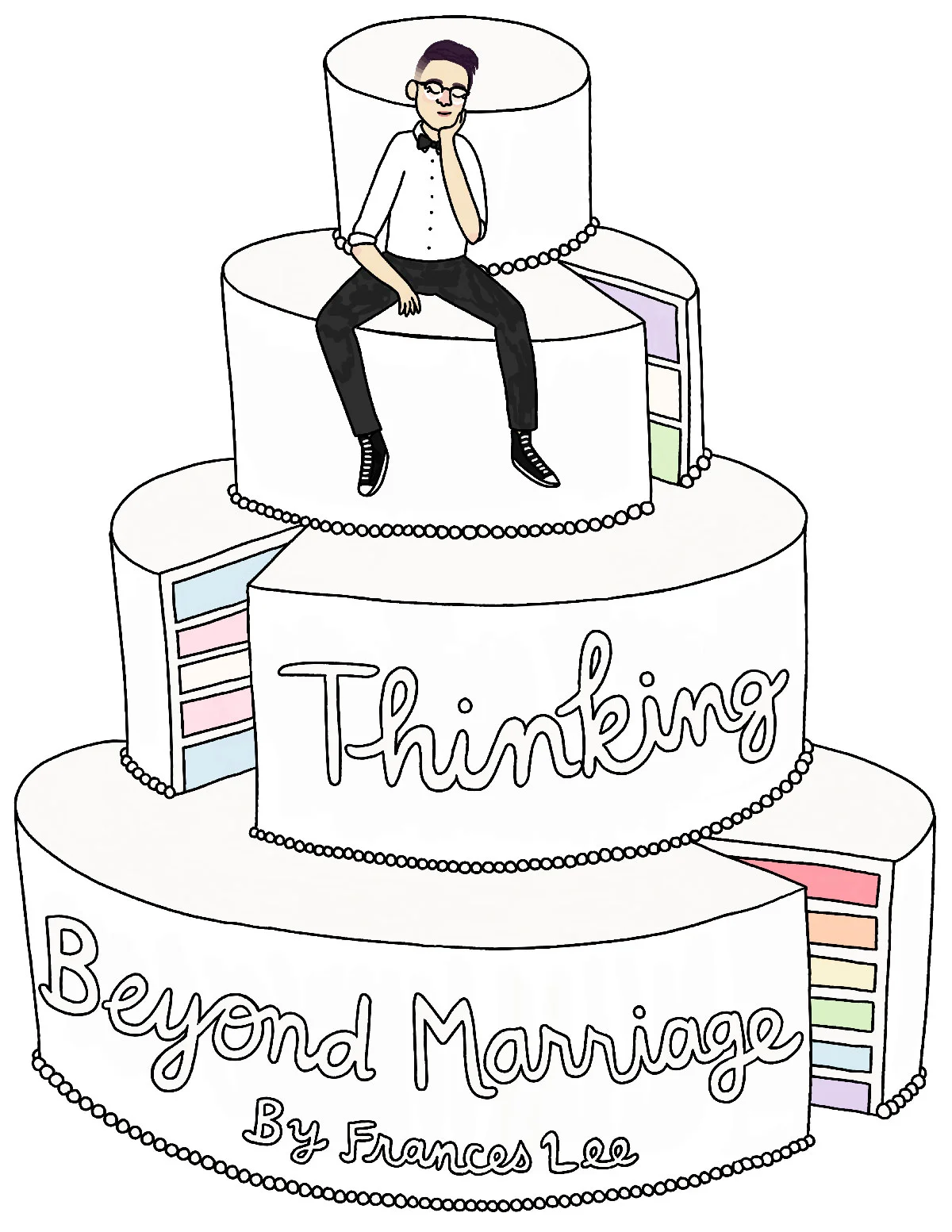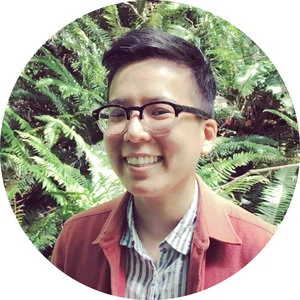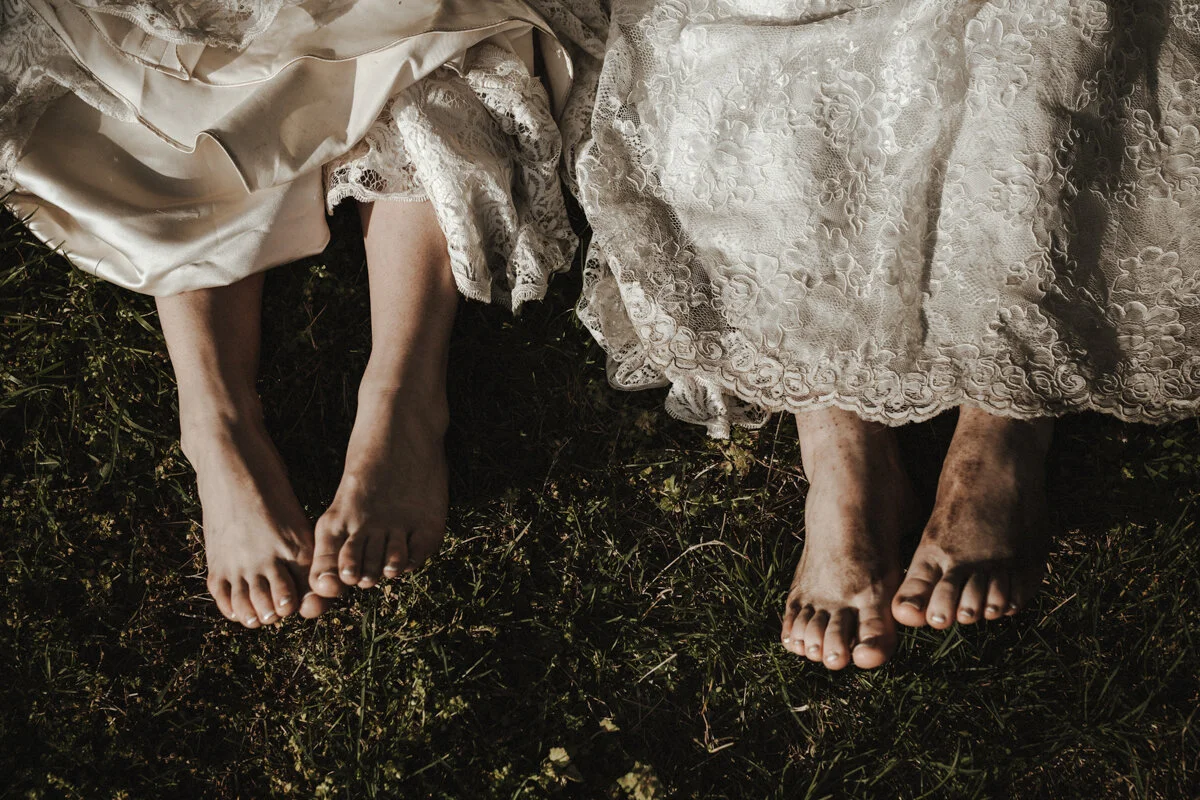Kin Aesthetics // Thinking Beyond Marriage
/After Divorce, Frances Takes a Queer Look at Partnership & Community
I was once married, for four years in my mid-twenties. I say “married,” but it was more like a trial performance of the Western heteronormative concept of marriage. My spouse was the first person I ever dated. I wanted to address the growing fears about my boyishness and un-dateability. I wanted to be a good Christian girl. And it was decent fun hanging out with this person. So I agreed to get married. We moved in together, adopted a kitten, threw a BBQ and pie wedding, spent awkward holidays with each other’s families, and hung out exclusively with straight white couples who threw garden parties and brewed their own beer. I grew used to being a “wife” and having a “husband.” Nobody questioned our roles, even though we were an interracial couple. And being married gave me a sense that I was no longer undesired.
By making what felt like my first adult decision, I had hopped on an escalator and couldn’t get off. We grew to love each other, and I wasn’t miserable. Yet I increasingly wondered, is this it? This was the only adult future I knew, and eventually it stopped feeling like I was ever given a choice. All our friends put on unwavering performances of marital happiness, so for a long time, I believed there was something terribly wrong with me. We could’ve continued in this inert fog for the rest of our lives, stuck in the cycle of reaffirming and reproducing societal norms. But in year three, we shattered our carefully constructed realities: my spouse came out as a trans woman, and I came out as queer. We tried our best to learn and tend to each other’s pain.
Most of our friends didn’t know what to do with us and backed away. Unable to handle the immense transformations without an established queer or trans support network, we grew cruel to each other, exploding our marriage into a raw mess. Shortly afterward, we divorced and moved away to different cities in the Pacific Northwest to rebuild our separate new lives as radical single queers.
Since taking on a queer identity, I’ve been given an opportunity to explore and play with my gender through the way I present and interact with others in community. I now identify as trans non-binary, which simply means that I don’t particularly feel like a man or a woman. Because Western society is founded on a violent enforcement of patriarchal gender and sexual norms, it can be heartbreaking to move through the world in this way. My mother protests whenever I freshen up my fade at the neighborhood barber, shooting me a grimace as though I’ve failed as her daughter. I was recently fired on my second day at a new company, and I’m convinced it had to do with their obvious discomfort at my non-normative gender identity.
Down with a lifetime of forced heteronormativity! Love whomever you want, however you want!
Even so, I thank my unconventional gender and sexuality for freeing me to think about, struggle with, and redefine my relationships to my body, other people, and marriage. It’s been two and a half years since my divorce, and I am happily partnered with an amazing woman. The world of cheesy love songs opened up to me after meeting her. And yet, I am still so terrified of revisiting marriage, of feeling trapped, that my untended fears have nearly destroyed our relationship. When I originally approached Catalyst about the topic of queer marriage, I wasn’t prepared to formulate a position on it. The pain of past failure and abrupt separation still rustles deep inside of me. Yet this past experience of getting entangled in a dominant narrative of love does not define my future. I can pen my own story.
When I first entered the queer and trans community a few years ago, I was greeted with a slew of unfamiliar language, gender expressions, and values. I adopted many of these subversive cultural norms, most of which were in direct opposition to mainstream culture. A wholehearted rejection of the institution of marriage was one of them. Down with a lifetime of forced heteronormativity! Love whomever you want, however you want! Being queer married simply wasn’t a cool thing to do. Since then, the Defense of Marriage Act was struck down, and slowly, some of my queer and trans friends have married. Even with its unsavory past, marriage grants a couple a host of financial and legal advantages not enjoyed by singles. Who am I to judge their decision to access privileges, when it is already a struggle to survive in a homophobic, transphobic society? It’s a pretty practical decision when you have no other options.
I believe that queers can be radical in altering harmful cultural norms, while still participating in the institution of marriage. One way I see my friends and loved ones enacting this is through the redefinition of kinship. My partner has the quote “Treat your friends like lovers, and your lovers like friends” hanging up on the wall. It was coined by trans legal activist Dean Spade, who stresses the importance of looking beyond partnership for belonging and creating a network of non-romantic, loving relationships. It is socially acceptable for me to dote on and spend days on end with my partner; there are endless variations of this narrative of romantic love in popular culture affirming me. But, as I believe in the necessary structure of community for queer survival, I am constantly challenging myself to invest more deeply in my rich and varied friendships. It doesn’t feel natural, which I think is more of a reflection on the individualistic narratives I grew up with, rather than expanded kinships. Many of us do political organizing together along the lines of race and gender, which requires building a foundation of trust and conflict management that is not premised on an exchange of sexual or romantic love.
In David Richo’s book How to Be an Adult in Relationships, he asserts that healthy adults should not expect their romantic partners to meet more than 25 percent of their personal needs. My current partner and I bonded over an exploratory study of this book. After overcoming the initial shock of how unromantic it is, we have embraced this one quarter concept as a mutual goal. While we still can’t get enough of each other due to our harried schedules, we also acknowledge the need to cultivate other relationships: best friends, writing comrades, thought partners, drawing buddies, dim sum clubs, activist groups. In my small queer community, I’ve witnessed the focus of relationships shifting away from marriage or partnership as the primary site for cultural change. I adore my partner and want to continue building a life with her. And yet, our love and commitment for each other informs the love and commitment we offer to our own families and communities. If anything, the model of partnership and romantic love provides a familiar starting point for how we treat the other very valuable people in our lives.
This article originally appeared in Volume 4 of Catalyst Wedding Magazine.
FRANCES LEE
Frances S. Lee is a queer designer, trans baker, cultural studies scholar.






















